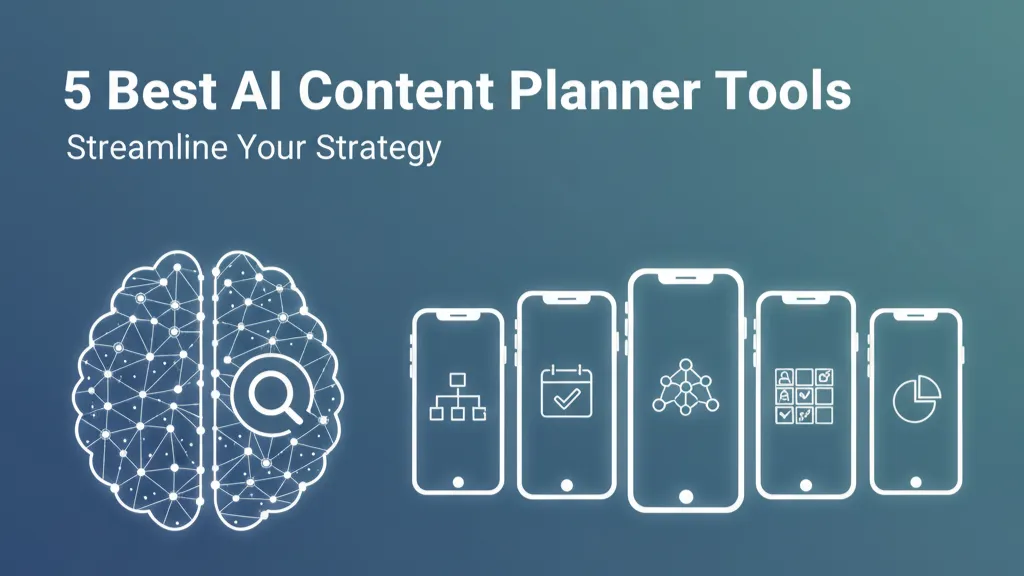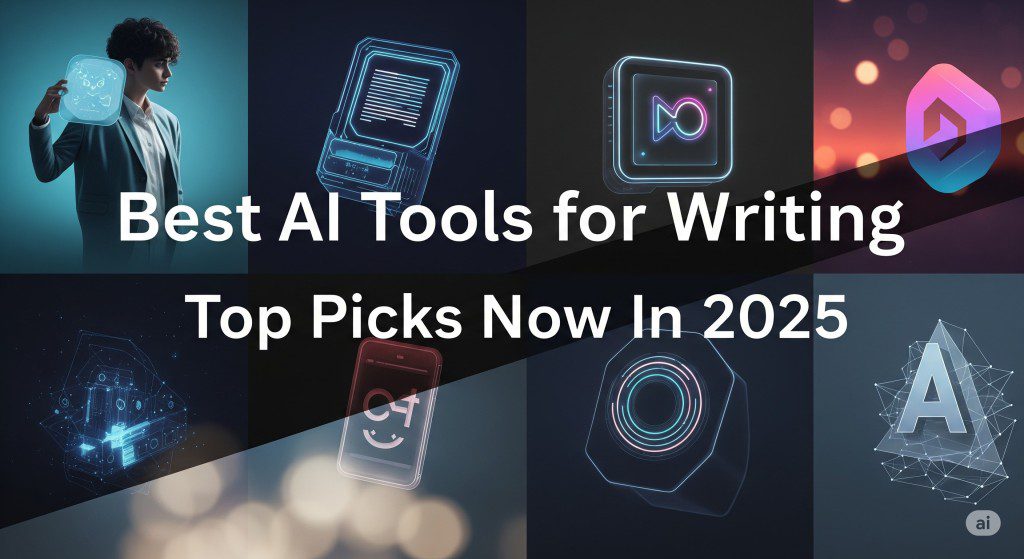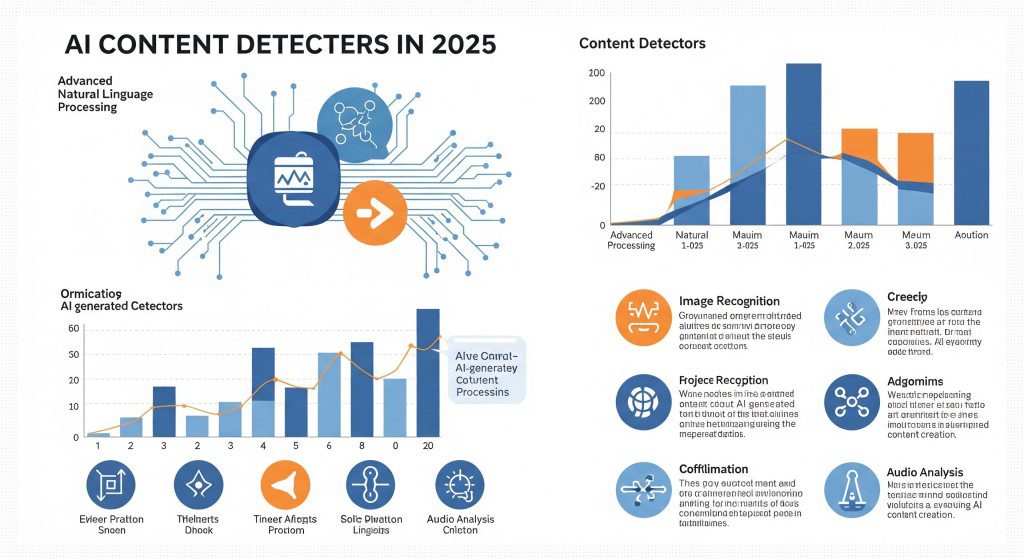Table of Contents
Toggle
What Is an AI Content Planner Tool?
Struggling to keep your content calendar from looking like a chaotic mess? You’re not alone. An AI content planner tools is your new strategic partner, designed to bring order and intelligence to the entire content creation process.
- So, what does it actually do? Think of it as a central command center that does the heavy lifting. It automates the tedious tasks that slow you down. This includes brainstorming fresh topic ideas based on real-time trends, strategically mapping relevant keywords to your content, and seamlessly managing your editorial calendar. It turns a scattered to-do list into a cohesive, data-driven strategy.
- You might be wondering how this differs from tools like Trello or Google Sheets. While those are fantastic for general project management, they are essentially digital blank slates. You have to build the system and manually fill in every piece of data yourself. An AI content planner, however, is built specifically for content. It doesn’t just organize your ideas—it generates them. It provides the strategic insights and automation, proactively suggesting what to write about and when to publish for maximum impact.
In short, it’s the evolution from a passive spreadsheet to an active, intelligent engine that powers your content forward, ensuring every piece you create has a clear purpose and a place in your overall strategy.
Why Use AI for Content Planning?
Let’s be honest: traditional content planning often feels like a guessing game. You spend hours brainstorming, only to wonder if your ideas will actually connect with your audience. Using AI for content planning changes that, transforming guesswork into a strategic, data-driven advantage.
- The magic begins with data-driven topic discovery. Instead of relying on hunches, an AI content planner scans search trends, audience questions, and competitor gaps to suggest topics you know people are actively searching for. This leads directly to the next benefit: predictive content performance. The tool can analyze historical data to forecast which of your ideas are most likely to rank and engage readers, helping you invest your time wisely from the start.
- But the support doesn’t stop there. You’ll also get automated SEO and keyword recommendations integrated directly into your workflow. The AI suggests primary and secondary keywords, optimal title structures, and even content length guidelines, ensuring every piece is optimized for visibility from the start.
- Finally, this intelligence flows seamlessly into your existing tools. With direct integration to platforms like WordPress, Notion, and HubSpot, you can move from a planned outline to a published piece without tedious copy-pasting. This creates a fluid content engine that saves time and reduces friction.
Ultimately, using AI for content planning isn’t about replacing your creativity. It’s about empowering it with data and efficiency, so you can create more impactful content, faster.
Top AI Content Planner Tools in 2025
Ready to move your content strategy from scattered to streamlined? The right AI content planner can be a game-changer, automating the busywork and injecting data-driven insights into your process. But with so many options, which one fits your workflow?

Let’s break down some of the top AI content planner tools making waves this year.
Surfer AI Content Planner Tools
- If your primary goal is dominating search engine results, Surfer is your specialist.
- It goes beyond basic keyword lists to visually map out a topical cluster strategy for your entire site.
- This tool is brilliant for ensuring every piece of content you plan has a clear, data-backed purpose and fits into a larger SEO puzzle.
Notion AI Content Planner Tools
- For teams that already live and breathe in Notion, this is a natural upgrade.
- Notion AI weaves content planning directly into your existing workspace.
- You can brainstorm ideas, refine outlines, and manage your editorial calendar without ever switching tabs, making it the ultimate tool for centralizing your entire process.
ClickUp AI Content Planner Tools
- ClickUp brilliantly bridges the gap between high-level strategy and daily execution.
- Its AI features help you generate task lists from goals, draft content briefs, and automate your scheduling.
- If you need a single platform to manage both your content and your team, ClickUp is a powerhouse.
Frase.io AI Content Planner Tools
- Frase is like having a dedicated research assistant.
- It automatically analyzes the top-ranking pages for any keyword and generates a comprehensive content brief.
- This tells you exactly what to cover, which questions to answer, and what your competitors are missing, making content planning incredibly efficient and targeted.
Jasper AI Content Planner Tools
- When you need to think bigger than a single blog post, Jasper’s Campaign Planner shines.
- It’s designed to orchestrate multi-touch campaigns across email, social media, and ads.
- The AI helps you brainstorm cohesive themes, generate consistent messaging, and map out a full-funnel content rollout.
Choosing the right AI content planner ultimately depends on your primary need: SEO authority, workflow integration, or campaign-scale execution. The best tool is the one that seamlessly fits into your rhythm and amplifies your strategic impact.
How AI Tools Improve the Content Planning Workflow
Does your content planning feel like a constant race against the clock? You’re brainstorming, researching, and scheduling, yet still struggling to keep up. This is where integrating AI tools into your content planning workflow can be a game-changer, transforming chaos into a streamlined, strategic operation.

- First, these tools automate repetitive research. Instead of you manually scouring the internet for trends and competitor analysis, an AI content planner does it in seconds. It tirelessly analyzes search data and social conversations, delivering a curated list of relevant topics directly to you. This reclaims hours each week, allowing you to focus on the creative side of content creation.
- But it doesn’t stop at ideas. The real power lies in how these tools provide keyword and intent insights. They go beyond simple volume metrics to decipher the real why behind a search query. This ensures the content you plan is perfectly aligned with what your audience is actively seeking, dramatically increasing its relevance and impact.
Finally, a superior content planning workflow maintains publishing consistency across platforms. AI tools help you build and manage a unified editorial calendar, offering smart scheduling suggestions to ensure a steady drumbeat of content for your blog, social media, and newsletter. This consistency is key to building audience trust and authority, turning sporadic posts into a cohesive content engine.
Tips for Choosing the Right AI Content Planner Tools
Feeling overwhelmed by the growing list of AI content planners? You’re not alone. Picking the right one isn’t about finding the most popular tool—it’s about finding your strategic partner. The key to choosing the right AI content planner lies in aligning its strengths with your unique needs.
- Start by clearly defining your primary goals. Are you laser-focused on dominating search engine results? Or is your priority a cohesive social media calendar? Perhaps you need to overhaul your entire blog strategy. Knowing your north star will instantly narrow the field, guiding you toward specialists rather than generalists.
- Next, scrutinize integration compatibility. The slickest tool is useless if it doesn’t fit into your existing workflow. Ask yourself: Does it connect seamlessly with your CMS like WordPress, your project hub like Notion, or your social scheduling tools? A deeply integrated planner eliminates tedious manual updates and creates a fluid content engine.
- Finally, don’t forget to evaluate AI accuracy and customization options. A good tool provides smart suggestions; a great one allows you to refine them. Look for platforms that let you input your brand’s unique voice and tone. The goal is an AI assistant that amplifies your expertise, not one that replaces your creative judgment with generic output.
By focusing on your goals, your workflow, and the tool’s adaptability, you can confidently select a planner that becomes a true extension of your team.
The Future of AI Content Planner Tools
The AI content planners of today are impressive, but they’re just the beginning. The future of this technology is shifting from being a helpful assistant to becoming a proactive, strategic partner. So, what can we expect? The evolution will be defined by deeper intelligence and unparalleled personalization.
- We’re moving towards truly predictive content calendars. Imagine a system that doesn’t just organize your ideas but actively forecasts the best time to publish them. By analyzing performance data, audience online behavior, and even real-world events, your calendar will become a dynamic blueprint for maximum impact, telling you not just what to publish, but precisely when.
- This intelligence will expand into cross-platform content intelligence. Future tools won’t see your blog, social media, and email in isolation. They will synthesize performance across all channels, understanding how a LinkedIn post influences newsletter sign-ups or how a TikTok video can fuel a blog topic. This holistic view ensures every piece of content, regardless of platform, works in concert.
- Ultimately, this leads to personalized AI planners for niche markets. Generic suggestions will become a thing of the past. We’ll see tools finely tuned for specific industries—whether you’re in B2B SaaS, local retail, or nonprofit advocacy. These planners will speak the unique language of your audience and understand the subtle nuances of your niche, delivering hyper-relevant strategies that generic tools can’t match.
The future of AI content planning is a bespoke, intelligent, and interconnected system designed not just to plan your content, but to predict its success.
Ready to Transform Your Content Strategy?
We’ve explored the what, the why, and the how of AI content planners. We’ve seen how they automate the grind, generate data-driven ideas, and bring intelligent structure to your entire process. You’ve met the top tools and learned how to choose your perfect match. The question is no longer if this technology can help you, but which one will become your secret weapon.
- The potential is undeniable: reclaiming hours lost to research, confidently creating content you know will resonate, and building a consistent, trustworthy presence for your audience. This isn’t about adding more complexity to your day; it’s about simplifying it with powerful, purpose-built technology. The shift from reactive scrambling to a proactive strategy is just one tool away.
- Pick a single tool from our list that aligns with your biggest pain point. Maybe it’s Surfer for its SEO mastery or Notion for its seamless workflow integration. Commit to a trial. Use it to plan your next content piece or map out a single campaign. Experience firsthand how it feels to have a strategic partner handling the heavy lifting, freeing you up to do what you do best: create. Your future, more productive and inspired content calendar is waiting.
Try integrating one of these AI planners into your workflow — you’ll save hours every week and never run out of content ideas again.
Frequently Asked Questions (FAQ) about AI content planner tools
Can an AI Content Planner Really Replace a Human Content Strategist?
The buzz in marketing departments is undeniable. AI content planners are popping up everywhere, promising to streamline our workflows and spark new ideas. But it raises a big, pressing question: Is this powerful tool a replacement for the seasoned human strategist?
Let’s be clear: It’s an augmentation, not a replacement.
Think of it like this. An AI content planner is your ultra-efficient junior assistant. It can analyze data at lightning speed, spot content gaps you might have missed, and generate a hundred headline ideas before your coffee gets cold. It handles the heavy lifting of data-crunching and initial ideation.
A human content strategist, however, is your creative director. They bring to the table what AI fundamentally lacks: lived experience, emotional intelligence, and brand intuition. They understand the subtle nuances of your audience’s pain points, can navigate complex brand voice guidelines, and craft a narrative that builds genuine loyalty, not just clicks.
The future isn’t about one versus the other. It’s about the human-AI partnership—where the strategist uses the AI as a powerful tool to execute a vision rooted in human insight.
What’s on the AI’s Plate? Blogs, Social, and Beyond
So, what can you realistically hand off to your new digital assistant? A surprising amount. Today’s AI content planners are versatile and can handle the foundational work for:
- Blog Posts & Articles: From generating outlines and meta descriptions to drafting full sections based on your keywords, AI can significantly cut down research and writing time.
- Social Media Content: It’s a pro at repurposing a blog post into a week’s worth of social captions, suggesting relevant hashtags, and even ideating visual concepts for your posts.
- Email Campaigns: Need a subject line that pops or a first draft for a newsletter? AI can generate numerous options tailored to different segments of your audience.
- Basic Ad Copy: It can quickly produce variations of PPC or social media ad copy for A/B testing, ensuring you never run out of fresh angles.
The key is to see the AI as the starting block, not the finish line. Its output needs your expert review, brand touch, and strategic polish.
The 2025 Price Tag: How Much Does an AI Content Planner Cost?
As we move through 2025, the market has matured, offering plans for every business size. You’re generally looking at three tiers:
- Freemium Plans: Great for solopreneurs or testing the waters. They often include basic planning features and a limited number of AI-generated pieces per month.
- Pro Tiers ($25 – $150/month): This is the sweet spot for most small to mid-size teams. You get more generous generation limits, access to advanced features like SEO optimization, and multi-user logins.
- Enterprise Packages ($500+/month): For large organizations, these plans offer custom AI model training, dedicated support, enhanced security protocols, and API access for seamless integration into existing martech stacks.
The trend is moving toward value-based pricing, where cost is tied to the volume of content and the depth of platform integration.
Your Data’s Safety: Is an AI Content Planner Secure?
This is a critical question. When you feed an AI your content strategy, you’re sharing your playbook. Security standards vary, so due diligence is non-negotiable.
Reputable AI content planners now prioritize security with features like:
- Data Encryption: Both in transit (using TLS) and at rest.
- Clear Privacy Policies: Explicitly stating that your prompts and data are not used to train public AI models without your consent.
- Compliance Certifications: Look for providers adhering to standards like SOC 2, GDPR, and CCPA.
Always review the provider’s security documentation. If it’s hard to find or understand, consider that a red flag.
The SEO Elephant in the Room: Will Google Penalize AI Content?
This is the million-dollar question. Google’s official stance has evolved. The search giant has stated it doesn’t penalize content solely because it’s AI-generated. Their focus is on quality—what they call “helpful, reliable, people-first content.”
The problem arises when AI is used to mass-produce low-quality, unoriginal, or nonsensical text (a practice known as “AI content spinning”). This has always been against Google’s guidelines, AI or not.
The verdict? AI-generated content is not penalized if a human expert rigorously edits, fact-checks, and infuses it with a unique perspective and value. Use AI as a tool for efficiency, not a substitute for quality. The human touch is what keeps you in Google’s good graces.
The Final Verdict: Partners, Not Protagonists
So, can an AI content planner replace a human content strategist? The answer is a resounding no. The intuition, creativity, and strategic oversight of a human professional are irreplaceable.
Instead, the modern content team leverages the AI content planner for its unparalleled speed and data-processing power, freeing up the human content strategist to do what they do best: connect, create, and build a brand that people actually care about. Embrace the partnership, and you’ll be unstoppable.

